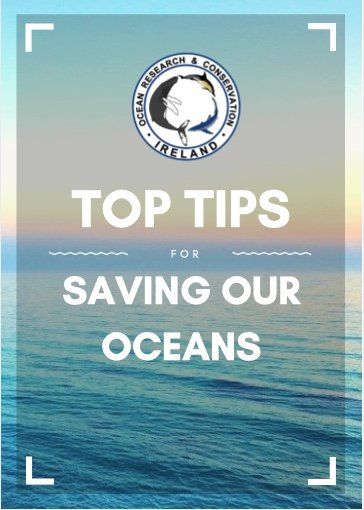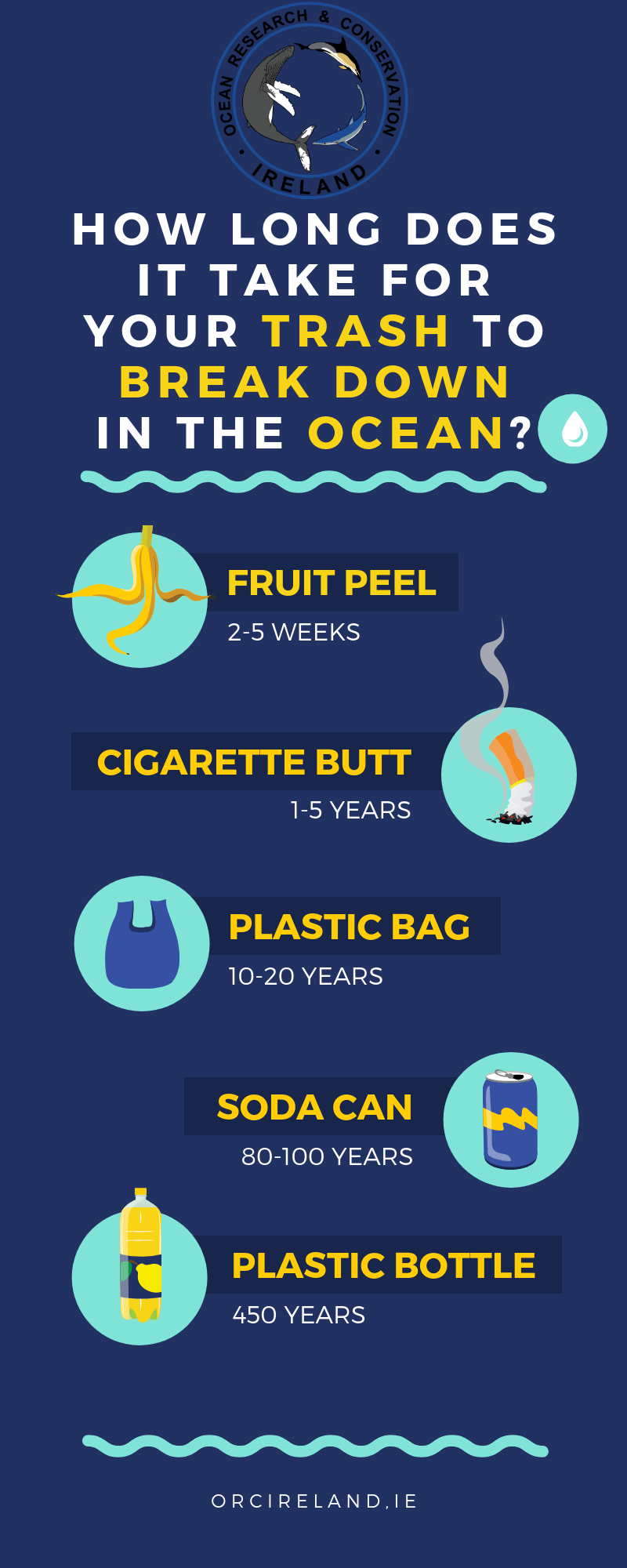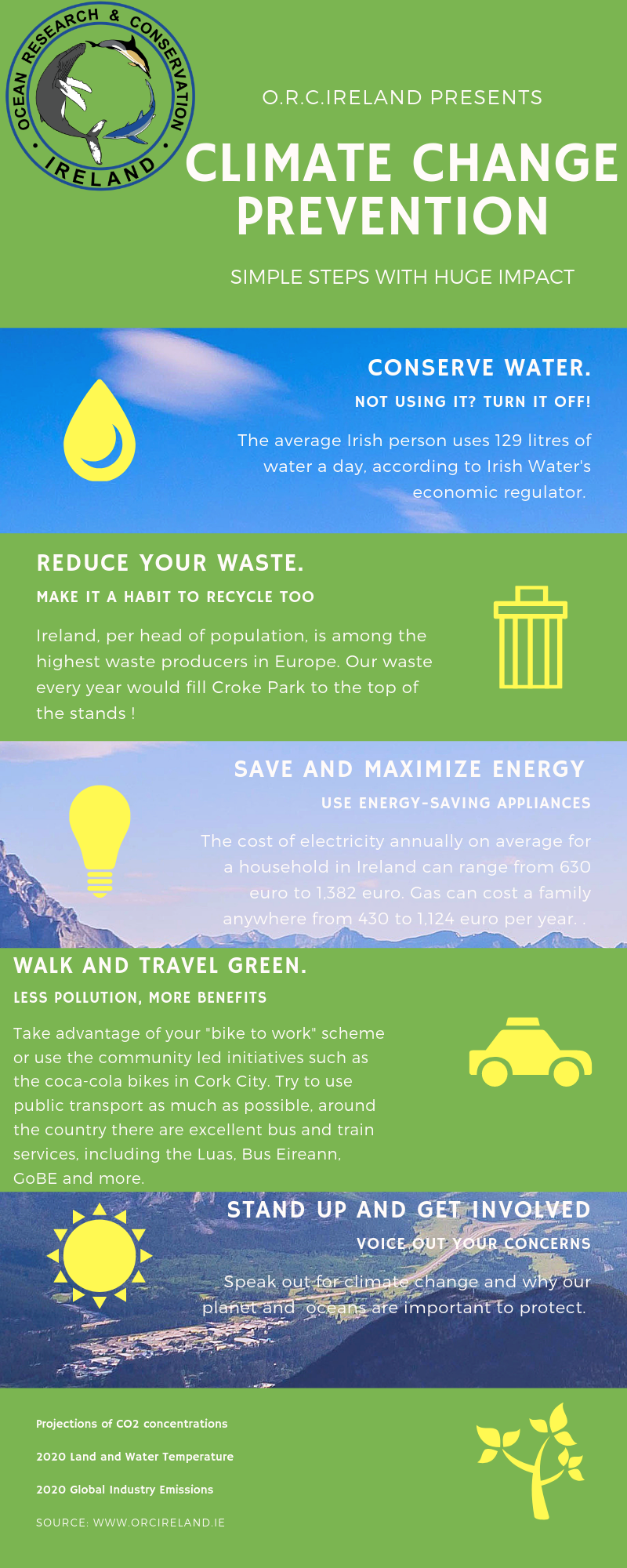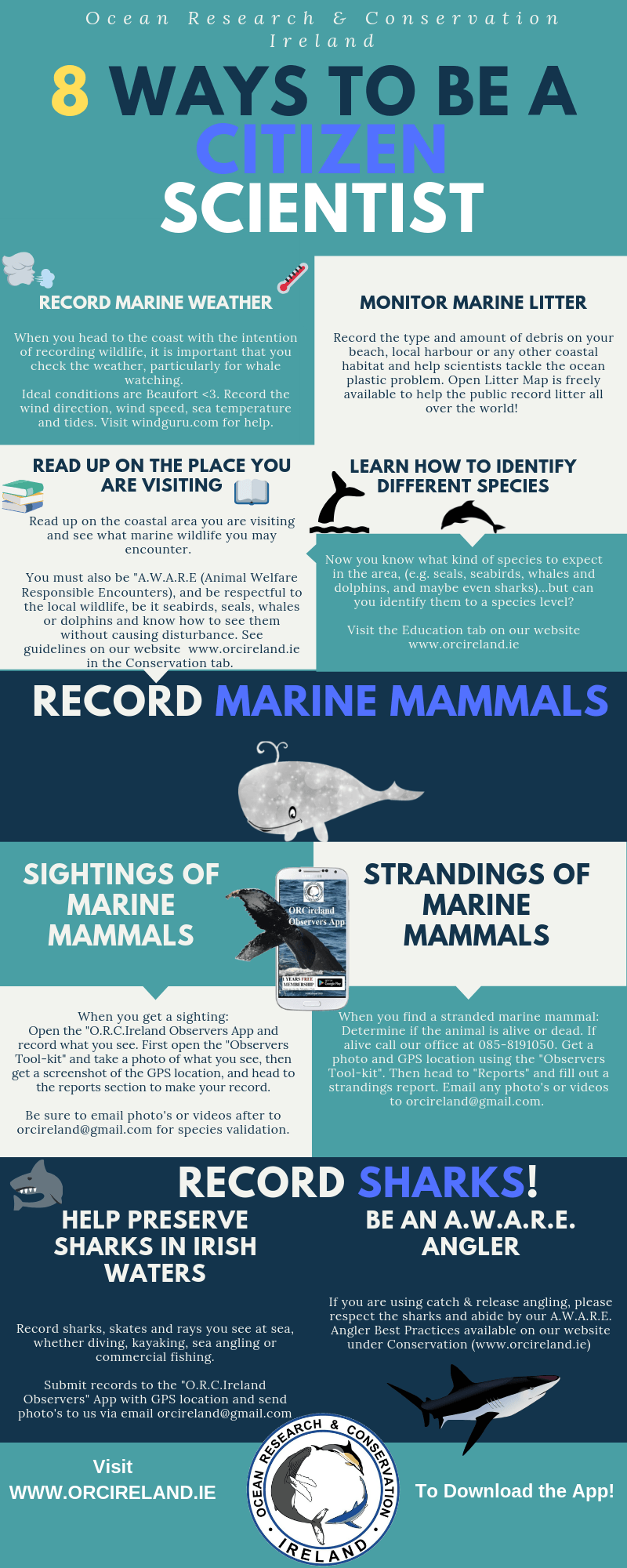TOP TIPS FOR SAVING OUR OCEANS!
Do you love the seaside? Enjoy watching David Attenborough's Blue Planet? Now has never been a better time in history to start celebrating our world's oceans and for Earth Day 2019, we have listed some top tips on how you can help save the ocean!
Reduce Plastic!
One of the best and most pressing things you can do to help save the ocean right now is to stop using plastic!! According to Eurostat Ireland is the biggest producer of plastic waste in the European Union, producing approximately 61kg of plastic waste per capita. Research has shown that 10% of marine mammal standings in Ireland had ingested plastic and it is estimated that 8 million tonnes of plastic waste makes its way into our oceans every year. One of the biggest steps you can take to help save and protect our oceans is to consciously reduce your plastic waste. It may seem difficult as so many of our everyday items are made of plastic or come wrapped in it. However, once you start looking for alternatives there are many to be found! Swap plastic shopping bags for canvas ones, when you are next replacing your toothbrush opt for a bamboo one, pick yourself up a reusable coffee cup and avoid disposable take out cups. There are so many alternatives to traditional plastic products coming into the market now. When you are out shopping ask in your local shops and pharmacies if they stock plastic free alternative products. If there are many people buying plastic free or asking for plastic free products, shops and companies will begin to recognise a consumer desire for plastic free products, and hopefully respond! If we all take responsibility for the impact we have as individuals on our environment and can make small adjustments to our lifestyles, these small changes that will make the big difference!
Eat Sustainably!
Try to make an effort to eat sustainably! When most of us go shopping we are keen for quick and convenient experience and are now accustomed to eating a huge variety of food imported from all over the world, available year round. Labels on the fruit and vegetables in our supermarket tell us that these foods have come from Spain, New Zealand, South Africa….and many people are unaware of the size of the carbon footprint generated to make these foods available to us, the damage to land and sea associated with intensive farming techniques, and the pollution caused by erosion run off and the use of pesticides. Eating local produce is a great step towards reducing the carbon footprint of your food, as well as having the benefit of supporting local businesses and farmers. Try to eat organically farmed produce and try to focus on buying what is in season. While it might seem like a chore to figure out what is best to buy, there are a number of apps available to make it easy for you! Apps such as Seasons and Seasonal Food Fruits and Vegs give you information and food calendars for the year to help you figure out what foods are naturally in season. In terms of fish, it is well known that many fisheries around the world are over exploited. Over fishing and the loss of marine animals as by catch is devastating our oceans. If you are buying fish there is a great app called the Good Fish Guide. This app from the Marine Conservation Society tells you which fish are good to eat and which to avoid based on whether they come from well managed sustainable stocks and farms. By adopting some of these changes you can drastically reduce your carbon footprint and ensure that when you spend money in the supermarket you are supporting sustainable food sources!
Reduce Meat!
Don’t be alarmed! Many people are switched off by messages telling them to cut meat from their diet! The meat industry worldwide has a significant impact on the health of our oceans. Aside from the pollution which runs into the ocean as a result of erosion, pesticide use and disposal of animal waste, this sector is one of the major greenhouse gas emitters driving global climate change. One of the biggest drivers is deforestation is the need to create more land for beef farming to meet global consumer demands for meat. According to an EPA report assessing Irish Greenhouse Gas emissions from 1990 to 2015, agriculture is the biggest contributor of greenhouse gases by sector in Ireland. While run off of waste and eroded land is detrimental to coastal ecosystems, increase in ocean temperatures through global warming will lead to a vast changes in ocean chemistry and extensive death in our oceans. It is not necessary for us all to suddenly switch to a vegan lifestyle but a reduction in meat consumption can result in the reduction of greenhouse gas emissions and relieve pressure on land and water resources. If we were all to make an effort to cut some of the meat from our weekly diet we can make a big impact! Try it out and have one day a week where you don’t eat meat, it will be a lot easier than you think! Check out The Darwin Challenge app, this app is created for people who are trying to incorporate meat free days into their diet and lifestyle, this app shows you how these meat free days are benefitting you and the world around you, give it a try!
Become a Citizen Scientist!
Citizen science refers to research carried out and data collected by volunteer members of the public. Help contribute to efforts to gain data and insight into our marine environments, our marine species, the changes in our weather and the monitoring of marine litter. You can attend workshops on different subjects or download any number of apps designed to enable you to contribute to the protection of our oceans. Check out the workshops run by ORCIreland this summer or download our app ORCIreland Observers to become a #OCEANHERO!
For more information on getting involved in citizen science check out our website.
Support!
There are a number of different organisations in Ireland working hard to raise awareness and educate the public on ocean conservation, that aim to protect and conserve the marine environment and the animals that live within it. Do a little googling and find out about some of the great work organisations are doing at the moment, like their Facebook pages, follow their Instagram and check out their websites and sign up to become a member! Often membership includes regular newsletters and extra information and opportunities to get involved in helping conserve nature. Membership fees are often small but are a very welcome contribution!
You can help support ORCIreland and/or become a member on our website:
https://www.orcireland.ie/take-action
Join or Organise an Ocean Event!
If you have taken the previous advice and liked, followed or become a member of an ocean conservation group keep an eye out for any events they may be organising. For example ORCIreland regularly runs marine mammal identification workshops and educational whale watching boat trips during the summer months as well as beach cleans all over Ireland! Many organisation run educational events, eco workshops and fundraisers. Join an advertised event or help plan your own for your area! Contact ORCIreland through our Facebook page if you wish to organise a beach clean in your area! Check out some Facebook pages and websites and plan some new experiences this summer, rope in as many people as you can, learn new skills, gain some new experiences, meet new people and contribute to ocean conservation!
Tell Everyone You Know-Spread the Word!
Tell all your friends and family about ocean conservation and threats to the marine environment!! Our oceans can only be preserved if more and more people care and are inspired to help, through support of conservation efforts, but mostly just from changing their lifestyle and take active responsibility for the impact they have. If you spot a great article or see an event advertised, share it, if you have are interested in volunteering or have taken part or will take part in an event, rope people into joining you or tell lots of people about it afterwards and hopefully they will get involved too!
© Ocean Research & Conservation Ireland (ORCireland) and www.orcireland.ie , est. 2017. Unauthorized use and/or duplication of this material without express and written permission from this site’s author and/or owner is strictly prohibited. Excerpts and links may be used, provided that full and clear credit is given to Ocean Research & Conservation Ireland and www.orcireland.ie with appropriate and specific direction to the original content.
SHARE THIS ARTICLE

















